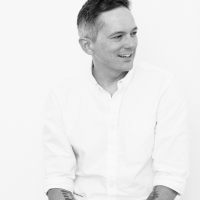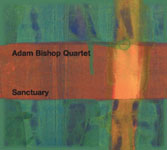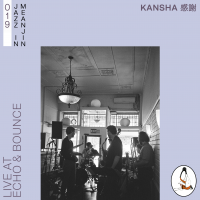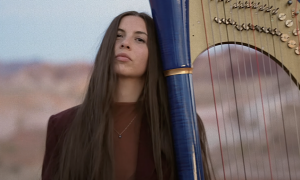Home » Jazz Articles » Interview » Peter Gordon: Innovation At All Costs
Peter Gordon: Innovation At All Costs
The Free Zen Society, as they're calling it, brings together (yet again) Thirsty Ear mainstays Parker and Matthew Shipp along with harpist Zeena Parkins for a subdued, ethereal affair meant for moments of reflection. From fire and brimstone comes the softness of water. Like many albums recorded and released under the banner of Thirsty Ear's Blue Series Continuum, The Free Zen Society forces the participants to respond to ideas and dimensions that challenge them as artists.
Gordon has overseen a lot of innovation since he and Shipp christened the Blue Series in 2003. Beginning with The Good and Evil Sessions that year, the Blue Series seeks innovation at all costs, pairing those from traditional jazz backgrounds with forward-thinking progressives in the fields of electronica, hip-hop and rock. Like the angular intensity of Spooky's Optometry or Antipop vs. Matthew Shipp, The Free Zen Society innovates also—by putting familiar musicians in unfamiliar landscapes, erasing all memory and inspiring them to create—from scratch, from somewhere inside; deep, deep inside, tapping into that proverbial well of inspiration.
Still, Peter Gordon finds himself answering questions. Lots and lots of questions.
Peter Gordon: There's a lot of interest. [The Free Zen Society] is unusual for us—it's unusual to even think of free jazz artists to get involved in this space. It almost seems like an oxymoron.
All About Jazz: Everything has a context though. It was surprising to me when I heard the record—or heard about it—but I don't think it's really different.
PG: No. And honestly we're talking about degrees here. When you talk about modern music and these players who have a real fire in their belly and can really just rip it up like the best of them, to see them going in to this space—really, these folks [Shipp, Parker, and Parkins] are very spiritual and they're very deep in their thinking. You don't necessarily think about it but when you think about them as complete human beings, of course the only way you can dig deep into your gut is to have very well thought out spirituality.
It's great because music is music. Contextually, what we do here at Blue Series is to really try to conceptually bring different things forward that hadn't been done before but always keeping it musical and always keeping it with compositional elements so it's finally music and not just a sensation.
AAJ: That's the idea of it being The Blue Series—continuum?
PG: Exactly.
AAJ: There's definitely a context within which each record sits. This record makes more sense following the release, or re-release, of the Nils Petter Molvær records last year [An American Compilation, Streamer and Er). Those albums prepared Thirsty Ear fans for Free Zen Society because they're a little more subdued as opposed to say Matthew Shipp vs. Antipop Consortium or the Beans record.
PG: Which are a little bit more angular. Exactly. I guess we're looking at a multi-faceted diamond. You're really looking at all different sides of a gem and each look gives you something special and that's what we keep trying to do. There's a lot of dimension here. The essence springs from the same well—we put a different face on it, which brings a deeper appreciation. If you just do the same thing over and over—it may be brilliant—but I think the ears just go deaf after a while. We need to try and change the setting a little bit—all of us do, in life. The same four walls that may be beautiful walls are going to start to close in on you after a while.
AAJ: The actual recording of this session took place a few years ago, correct?
PG: We've been active for a long time with these guys. The original thought with this record was to create a chamber group. We had never really done a jazz chamber group before. So we wanted to work actually with a UK-based turntablist named Philip Jeck who creates sort of orchestrated sounds out of turntables. So we wanted to create some soundscapes and some musical packages that could work within his language. That was the concept. We were also bringing in Spring Heel Jack to work with him as well. It just turned out that it wasn't quite right for everybody, for a myriad of reasons.
So [the raw recordings] just kind of sat. [We] still had the kind of chamber ensemble [feel] but we didn't have the other end to put the glue together on it. I guess I just sort of started revisiting it one day and going, "Well, nothing like the present to see what's buried in there. So I sort of dusted them off and started to dig in. I figured there was somewhere to go in there so we really started to think about it in terms of taking you to a different place. To use the language of jazz and improvisation but have the underpinnings be entirely different and take you to a place more meditative, more of a place where you can let your mind go and experience life in a different way, to remove the day from your mind and let you just kind of lift off and go somewhere.
That's what I spent a couple of years doing—over a thousand hours to put this thing together. It was very hard to do.
AAJ: This became a pet project for you. I sense this relief that it's done.
PG: It's a hard thing. It was retrofitting a concept that we came to later with a performance that didn't have that in mind. It was a painstaking restoration project you might say. But the key is that in order to do that correctly it has to sound natural. If it doesn't sound natural you've butchered the performance. It was a matter of doing a certain amount of rearranging. But because of the nature of this music, it's all about fluidity and you can't afford for it to sound like you've hacked away at this thing. You have to make it sound very, very natural. So you spend a lot of time making it sound natural even though you're mechanically going in there and putting the jigsaw puzzle together.
AAJ: It seems like this record was pieced together in much the same fashion that other Thirsty Records have been pieced together only this time the intended outcome was very, very different.
PG: That's a great way of putting it—the whole mindset was very different going in to this. The whole gestalt was very different. We didn't really have experience in this area so we had to really get enveloped in it. I would know after a session when I'd play it down if I could listen to a song and really be transported somewhere, then the song succeed and if I couldn't then there was irritant in there that didn't allow the mind to escape. So that was sort of the barometer—if you could lose sight of the day at the end of the song. It's a pretty tough thing to do.
In one way it has to be very, very simple but in another way there are many layers of complexity in there that achieve that simplicity.
AAJ: The "Thirsty Ear Method has always been that style of post-production. Do you see that as being a part of the jazz tradition in much the same way that a lot of the fusion records that Miles Davis did involved the splicing of tapes together from sessions? Do you conceptualize Thirsty Ear as being part of this tradition?
PG: We look at it on a project by project basis. If it calls for that [post-production] then absolutely you do it. If you want to be an evolving and growing label you have to look at each project and say, "In order to give birth to this project, what is the best way to do it.
You don't want to force fit every technique the same way because every musician is different and every recording session is different. I think this has been a good technique for us with certain artists and in certain situations but I think in other situations it would have been a complete and absolute disaster. Sometimes you do want to go for the organic and get the right guys to get in [the studio] and get out having had a magical experience.
What it does is it speaks loudly to the inability of musicians who are very busy and always running around the world to really be able to sit down together and just jam and just come up with concepts and ideas—to do all night sessions and just work through various new roads to take. You just don't have that anymore. You don't have the late night jam sessions where all the cool cats come down and create breakthroughs. In many ways we have to replicate that in post-production—the innovation that would have happened if time had been on a much slower and grander pace. I think it's a function of the times we live in as much as anything else.
AAJ: Totally—I'm a musician myself and there are plenty of times I will walk into rehearsal and say, "Look, can we just jam? Cause you don't want to work on those pre-rehearsed pieces all the time. Do you think that Thirsty Ear is lucky in that you have a loyal cadre of artists, particularly Matt Shipp and William Parker, who are so well rehearsed together and who are so familial?
PG: Yes, we're very fortunate to have a dedicated crew of musicians and those guys [Shipp and Parker] are almost telepathic. I think the larger issue is one: you have to have them and two: you have to have the willingness to just take what you throw at them and the willingness to get outside themselves and respond to a whole new situation. If there's a problem with music and jazz in particular today, it's that [jazz] is caught up in form and structure. And that should come later, after you've done the innovation. If we start with form and structure then you can't ever get beyond that—it becomes your prison. What we encourage at Thirsty Ear is to just let it go.
That's why we give artists different soundscapes and things to respond to because we're looking for them to push out. We're not looking to disorient them per se but to push out an unfamiliar form but within familiar territory so that you get an expression out of them that isn't automatic. It becomes more than, "Oh I've heard that chord progression before and I know how to get out of it. Here are transitions you haven't heard, here are rhythms you haven't heard. We trust your instincts, we ultimately believe in improvisation, we're giving you a way to open that up by giving you the unfamiliar so that we can tap into a place you haven't been to before.
AAJ: I've read that you approach some projects with a template that you want the artists to respond to. And that you will find the artists that suit that particular endeavor, and that's why you may see Craig Taborn instead of Matthew Shipp or Hamid Drake instead of another drummer on a certain record.
PG: Yes everything is project-driven. We don't have the luxury of just putting out the next quartet album or whatever. Each project has its own essence and it needs the right combination of musicians to bring that forward. That's where the magic is. You're bringing artists who may or may not have played together but you feel can respond to the stimulus you're giving them. That's what makes it special. The creative process becomes very collaborative on many levels and you have to have the right people. As opposed to musicians who have a well rehearsed thing, it's getting musicians in the room and there is where the magic happens.
AAJ: Being that Thirsty Ear is a label that has a limited number of records you can afford to put out each year do you feel that push to make every record special, and not to be fatalistic, because you don't know how much longer you can keep doing this?
PG: I think that's a personal goal that is regardless of longevity. This is my thirtieth year in the business and I only want to put out records that I feel make a statement and go to a place that I haven't been to before. I personally believe in the basic intelligence of the listener. If you believe in that then you believe that they also can go to places they've never explored before. And then it becomes your obligation to not give them a repetition of something they've heard. You have a professional obligation to take them to an unknown land. It's as much about keeping the interest alive for myself—if I can please that after all these years then I've pushed forward.
The record industry doesn't need more music. We have more music to last ten generations henceforth. What the industry needs more than anything else is innovation. Innovation is what we lack at this point. We are a very studied business and industry. Everyone studies each other and everyone has been influenced by each other. We have our great masters and no one can escape our big masters—it's like a quicksand we fall into. You have to force innovation because it's not promoted as greatness. If you look at the essence of jazz—that's the original punk rock back in the day. These guys are the bad boys, these are the guys that were saying "screw you to music, doing their late night sessions and cutting the cloth in a different way. [Jazz] has become so institutionalized it's become antithetical to its original roots.
When you have so much worship of the traditionalists its hard for young musicians to thrive because it seems like you're going to the alter every time [you play]. We're trying to encourage them to go to a different church and get a different flock going. We believe in a language of improvisation.
AAJ: In life, in general.
PG: Everything. But you can only base improvisation and you can only do well in that if you have an absolutely firm foundation on the basic principles of what you're doing. If you're improvising just to do it, you're spurting out nonsense. If you improvise knowing the basic so-called rules and knowing the basic principles and then taking that and reconstructing that in an innovative way, then you're working forward from an educated point of view as opposed to a punk rock point of view, which is more of an attitude. Which is okay—that works there. It's a different aesthetic. We respect tradition but we're here to screw it up.
AAJ: I think that what Thirsty Ear does can speak to younger people and it goes against this notion that jazz is dead or that young people don't listen to jazz. But do you feel a pressure with this dichotomy of wanting to put out records that are innovative, and The Free Zen Society does that, versus putting out another record with Beans or El-P or someone you know that young people will identify with and who might pick up this record.
PG: Again—project by project. I think innovation is the key. And if it's with the hip underground rappers like El-P, Beans, or Mike Ladd and we have the right project together then absolutely. We're not driven by a commercial formula we're driven by an artistic vision. Granted, we did just have our first Grammy nomination [Sex Mob's Sexotica]—we didn't get it and maybe that was some oversight of the Grammy committee. You get there because finally the project is successful.
You're trying to hack down with your machete a new path because the old path is time honored, time worn and just worn-out quite frankly. We always felt the concept of jazz in particular was about doing something fresh and doing something special.
It's hard to do that with such a body of work behind you that is so well documented. You've gotta find your own path. That's what we do. And we're not limited to just using jazz musicians. Jazz is the basic rooting but we bring in those other types of musicians who can bring in a different aesthetic and bring [the project] to a different place.
Jazz doesn't succeed because it's not in the common culture. The common culture is about today not about yesterday—yesterday is history. And if jazz wants to be alive and it needs to be alive, it needs to relevant and it can't be relevant if you're always tipping the masters of fifty years ago. It can only be in historical society then. The masters are great and the masters will never be topped and that's precisely the problem—they never will be topped. So let's try something new! Let's try something fresh.
AAJ: I sense that you could care less but do you sometimes feel that Thirsty Ear is the bastard child of the jazz scene—that there is some sort of jazz "establishment that frowns upon Thirsty Ear and Matthew Shipp and William Parker. I've always sensed that those guys don't get their due.
PG: We always consider ourselves the Antichrist of jazz. I don't know if that is a calling card or a badge of honor. We just didn't come out of the institution of jazz—we came out of the spirit of jazz. And that's a very different place to come from. We don't think what we're doing is very unusual—but then again David Lynch doesn't think he's an unusual filmmaker.
We always felt the mandate of jazz was to be a chameleon and to change with the times. Maybe we're taking things to literally and we're the only ones doing it but we don't feel we should be the only ones doing it. We feel everyone else should be on board with us. It's about going to a place that no one's been to before. It speaks more loudly to that, if we're alone in that vision—are we wrong and everyone else is right or are we right, and everyone else is wrong.
AAJ: You mentioned punk rock a number of times. Do feel an affinity towards, or do you watch what other independent labels are doing? Do you applaud the innovation that's going on in those scenes just as much as what you guys are doing at Thirsty Ear?
PG: Well I don't look at music on a genre basis. I just look at music as music. One of the problems today is that we've sliced music into little cubicles, which becomes a deterrent to people listening to music. It also means that you now all of a sudden have opinions you didn't know you had—whether you like punk or not, whether you like hip-hop or not. And anytime you generalize something like that you're going to paint with such a wide brush you're going to miss all the nuances.
Punk rock—you know I was introduced to free jazz by Henry Rollins, who is certainly a great punk rockers, when we ran his label 2.13.61. So I kind of owe it to Henry for opening my ears to it. The musician on a punk rock level is actually very different than what it is on a jazz level. They're actually two ends of the spectrum. One is attitude with barely an ability to play and the other is virtuoso playing based on deconstructionist attitudes.
So it's from beginner with attitude on one end to completely off the scale in technical ability on the other. But what they share is the excitement and the energy level and playing from the guts and just playing with wild abandon—playing devoid of institutional convention. And that is what makes music exciting—when people are fired up and burning and not self-conscious about it. That's what turns people on when you can feel that transference of energy.
You have to be careful to know what you're good at, be true to your vision and to push yourself and not relax.
AAJ: When I interviewed William Parker when Luc's Lantern (2005) came out he spoke about searching for the center where the music comes from and as long as your path to that center is pure then what you develop once you've reached that center cannot be judged.
PG: That's well-put and his company is called Centering Music and what he's saying not just generally but specifically, is that it is then uniquely William Parker. Just as we all have unique finger prints and unique DNA he's found his musical DNA and brought it forward. You almost have to take all you know and then throw it away and then start over and be pure with it, knowing that your technique will help you speak in a unique voice.
I remember I had teacher who said to me, "Practice like a dog and then when you perform, just forget everything. And that's how you get to you. The more you think when you play, the more you're just doing a performance of written material. The more you let go, the more it becomes you as an individual just speaking to the world.
AAJ: Tell me about your relationship with Matthew Shipp.
PG: When Matthew was on 2.13.61 and Thirsty Ear was running that label while Henry Rollins was pursing other things, I remember saying to him, "You know, any time you want to record on Thirsty Ear you let me know. And that was in the '90s. Then one day he said, "Okay let's go do but then that's it—it's my last record and I'm retiring. I don't want to do this anymore. And it's a well-known story. This was his goodbye record—DNA (1999), a duet record with William Parker. The two of them are just very intuitive players with each other. They really come from different places but as a union they create a whole that is just very special.
I was always interested in jazz, studied it and played it, but Thirsty Ear as a label was always involved in rock and alternative music. I never felt there was a reason to get involved in jazz unless we could come up with something new and something special because there's already a lot going on out there, plenty of jazz documented and the world certainly doesn't need another slab of plastic out there just doing the same thing. So I said to [Shipp], "Would you consider working with me on this new concept. We could really just take a whole different approach to jazz.
Free jazz is a very difficult term because it means everything and it means nothing. If anything else it pushes people away and really isn't a very good term. Let's say "new jazz and it's all about that. We started thinking about ways to create ensembles and create an emotional and intellectual space that was very different than the normal recording attitude. Every record would have to have an aesthetic; every record would have to have a purpose. We have to be able to hear it in our mind before we even open up a note and it would all have an approach that was totally unique. But because each record would have aesthetic of its own they ended up having a common aesthetic that the artists were reaching towards something.
That's why The Blue Series has maybe sixty, sixty-five releases, and their all different but you kind of know they belong in the family. That's because we've really tried to allow every record to breathe on its own, to be its own person. But it's brought along with an aesthetic that is common but unique on its own. A curiosity that is common in all the records.
Matthew is very deep and rich in his thinking. He's a student of the industry. Together we could really get in there and say "How can we take this all apart and then put it together again. So we use all our knowledge and then throw it away and come up with something special. You know you have your body of knowledge but you find yourself saying, "I've done that before therefore I can't do that anymore. You put all these road blocks in your thinking in order to create something fresh and new. That's what the Blue Series is about.
Selected Discography
Gang Font featuring Interloper (Thirsty Ear, 2007)The Free Zen Society, The Free Zen Society (Thirsty Ear, 2007)
Sex Mob, Sexotica (Thirsty Ear, 2006)
Carl Hancock Rux, Good Bread Alley (Thirsty Ear, 2006)
Beans, Only (Thirsty Ear, 2006)
William Parker, Luc's Lantern (Thirsty Ear, 2005)
David S. Ware, Live in the World (Thirsty Ear, 2005)
Mike Ladd, Negrophilia—The Album (Thirsty Ear, 2005)
Yohimbe Brothers, Tao of Yo (Thirsty Ear, 2005)
Charlie Hunter & Bobby Previte as Groundtruther, Longitude (Thirsty Ear, 2005)
Charlie Hunter & Bobby Previte as Groundtruther, Latitude (Thirsty Ear, 2004)
Big Satan, Souls Saved Hear (Thirsty Ear, 2004)
David S. Ware, Threads (Thirsty Ear, 2003)
Antipop Consortium, Antipop vs. Matthew Shipp (Thirsty Ear, 2003)
William Parker Violin Trio, Scrapbook (Thirsty Ear, 2003)
Roy Campbell, It's Krunch Time (Thirsty Ear, 2001)
Tags
PREVIOUS / NEXT
Support All About Jazz
 All About Jazz has been a pillar of jazz since 1995, championing it as an art form and, more importantly, supporting the musicians who make it. Our enduring commitment has made "AAJ" one of the most culturally important websites of its kind, read by hundreds of thousands of fans, musicians and industry figures every month.
All About Jazz has been a pillar of jazz since 1995, championing it as an art form and, more importantly, supporting the musicians who make it. Our enduring commitment has made "AAJ" one of the most culturally important websites of its kind, read by hundreds of thousands of fans, musicians and industry figures every month.



























